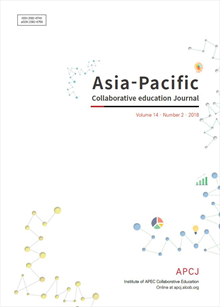간행물
Asia-Pacific Collaborative education Journal

- 발행기관 APEC국제교육협력원
- 자료유형 학술지
- 간기 반년간
- ISSN 2092-674X (Print)2092-6758 (Online)
- 수록기간 2004 ~ 2021
- 주제분류 사회과학 > 교육학 사회과학 분류의 다른 간행물
- 십진분류KDC 371DDC 379
권호리스트/논문검색
Volume 3 Number 1 (2007년 6월) 9건
1.
2007.06
구독 인증기관·개인회원 무료
2.
2007.06
구독 인증기관 무료, 개인회원 유료
4,000원
3.
2007.06
구독 인증기관·개인회원 무료
4.
2007.06
구독 인증기관 무료, 개인회원 유료
'Directions of APEC Future Policy for JCT in Education' aims at identifYing trends of APEC policy for ICT in education, its related issues, and makes recommendations for future policies. The results of this research are expected to provide a benchmark for educational ICT policy making in APEC economies with reference to policy trends produced by this project. They also provide insights and hindsight on ICT educational policymaking to all parties concerned. APEC economies should find the results beneficial in terms of new policymaking and enhancement of present policies. The recommended policy areas should be translated to generate businesses suited for industries related to ICT and education. As to the methodology, from eleven APEC economies the sample is reduced to eight due to complications in communications and documentation. Information needed was obtained through the internet. The project leader organized and distributed the collected data online to other members of the project (PR. China & Thailand) for analysis. The technique of content analysis was applied and trends on APEC educational JCT policy were identified. Findings from the data analysis were tabulated and are attached as appendices in the APEC white paper.
6,000원
5.
2007.06
구독 인증기관 무료, 개인회원 유료
This project aims at suggesting the direction of school leadership in relation to education management through conducting a case study of Indonesia. For a long time, Indonesia has focused on a centralistic education management, Thus, every school principal had limited authority in policy making and in running the school management functions being constrained by these particular guides and other government rules. In 2000, in implementing the Law number 2211999 on Regional Autonomy, Indonesia was able to advance the decentralization of the education management system. Every autonomous region (in this case district or kota/mayoral) has greater authority to run its education management functions in its own region, especially those at the primary and secondary levels of education. This has affected the need to reform education and school management in regard to making it more effective and more efficient by applying the principles of accountability and transparency. In the future, school management will apply a school-base management approach. Its application needs to be supported by the application of ICT
4,000원
6.
2007.06
구독 인증기관 무료, 개인회원 유료
arched for standards in teacher competency for the different economies in the Asia-Pacific region. We found information about them in several documents contained in the UNESCO and in the Ministry of Education of each economy. After that, we looked for common strategies to propose a model for teacher training with ICT and in the use and introduction of ICT in schools. We found that there are a lot of commonalities, specifically that teachers should be competent in a variety of software and technological tools appropriated to the topic they teach and the students 'age, assess the software and technological tools relevant to the topic they teach and their potential to be used in class, use the computers in a constructive way and to prepare and utilize work plans that incorporate the use of technology. But despite all the advances and recommendations about ICT introduction in teacher training, we still lack a common model that allows us to exchange and share information regarding this issue, even within the Asia-Pacific region. We tried to put these competencies in one single place so that people can access and consider them in developing a teacher training or ICT introduction to classrooms programs.
4,000원
7.
2007.06
구독 인증기관 무료, 개인회원 유료
It is an important issue for APEC economies to build mutual understanding in order to promote friendship and cooperation among the economies. Some schools and organizations have set up international communication projects to correspond by email or video conferencing periodically. There are, however, some barriers that hinder these activities. Firstly, most schools do not have experience. Secondly, teachers have difficulty in such endeavors speaking and writing in English. Thirdly, funding is not adequate. The World Youth Meeting (WYM) is one successful international collaboration project lasting six years. In this research, we investigate the WYM as a model case in order to understand how the WYM is organized so that we can develop guidelines for other international collab-oration projects.
4,000원
8.
2007.06
구독 인증기관 무료, 개인회원 유료
As to the unexpected future and rapid changes of technologies, world famous scholars and experts have deliberated an ideal model of future society and suggested a way to overcome future challenges. APEC Future Education Consortium seek to develop a community model of future education, embodying a 'Total-supporting System, ' and advancing research activities to meet the challenges of the IT-based future society while emphasizing a value oriented society and considering the harmony between technologies and human beings through implementing the EduPark.
4,000원
9.
2007.06
구독 인증기관 무료, 개인회원 유료
4,000원

